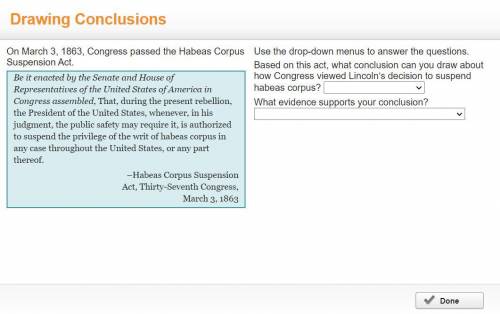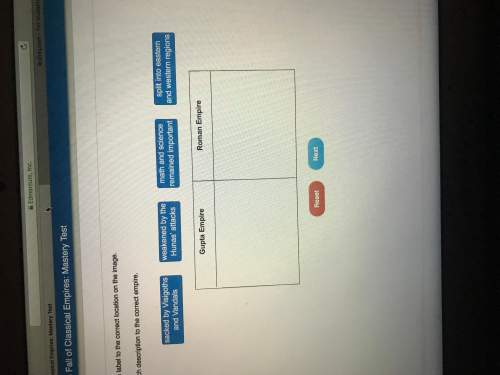
History, 28.01.2021 04:30 chasechevy13
"On March 3, 1863, Congress passed the Habeas Corpus Suspension Act.
Be it enacted by the Senate and House of Representatives of the United States of America in Congress assembled, That, during the present rebellion, the President of the United States, whenever, in his judgment, the public safety may require it, is authorized to suspend the privilege of the writ of habeas corpus in any case throughout the United States, or any part thereof.
–Habeas Corpus Suspension
Act, Thirty-Seventh Congress,
March 3, 1863"
Use the drop-down menus to answer the questions.
1. Based on this act, what conclusion can you draw about how Congress viewed Lincoln’s decision to suspend habeas corpus?
-They supported it
-They were neutral
-They were against it
2. What evidence supports your conclusion?
-They passed an act to legalize Lincoln's actions
-They refused to get involved in the controversy
-They passed an act to limit Lincoln's power


Answers: 1


Other questions on the subject: History


History, 21.06.2019 21:10, cgarnett5408
The christians in jerusalem met in the catacombs for their worship service
Answers: 3

History, 22.06.2019 02:00, yourmumsanoodle
Why did the paris peace conference negotiations last over a year?
Answers: 1

History, 22.06.2019 02:40, cooltrey777
Nationalism led to major conflicts following world war i, especially when:
Answers: 1
You know the right answer?
"On March 3, 1863, Congress passed the Habeas Corpus Suspension Act.
Be it enacted by the Senate an...
Questions in other subjects:

Mathematics, 26.10.2021 01:40

Physics, 26.10.2021 01:40

Social Studies, 26.10.2021 01:40



History, 26.10.2021 01:40

Geography, 26.10.2021 01:40






